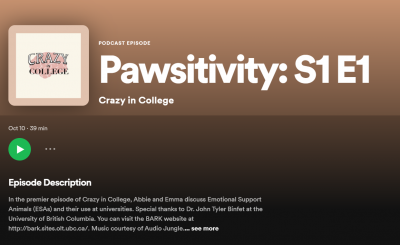College brochures and campus tours may promise prospective students a plethora of resources to manage their health and well-being, but life on campus oftentimes poses unique hurdles for those struggling with mental illness.

At Boston University, that’s no different. Sophomores Emma Cohen, in the College of Communication, and Abbie Johnson, in the College of Arts and Sciences, host and produce “Crazy in College,” a podcast that explores how students at BU and beyond navigate mental health during their time as undergraduates.
Launched Oct. 5, the podcast has released two episodes so far.
Johnson said the pair’s personal conversations among friends about mental health inspired her and Cohen to begin a discussion with a broader audience.
“We’re hoping that it can just be a resource for all college students to have a place to relate to and share their experiences,” Johnson said.
Cohen and Johnson said they faced similar struggles adjusting to campus life when they arrived at college, which were exacerbated by mental illnesses.
The pair found that their experiences were similar to those of friends and peers at BU who have sought help in dealing with mental health.
“I think it’s pretty widely known that there’s a stigma against Student Health Services on campus,” Cohen said. “They have a bad reputation at times from the student body, and I think that extends to the mental health resources as well.”
Some of the broader programs offered by BU, such as the Wellbeing Project and free subscriptions to the Headspace app, are a “great start” for students with mental health concerns, Cohen said. However, she said she views these programs as supplementary to core mental health services she feels students still need.
Beyond on-campus services offered directly to students, those struggling with mental health can face challenges and insensitivity within the classroom.
Johnson described one experience with a professor who, in describing the incorrect way to solve a problem, said anyone attempting to use that method was “schizophrenic.”
“How do teachers not know to not say something like that in relation to mental illness?” Johnson said. “I joined the Mental Health Committee right after that and was like, ‘I just need to do something.’ So then [the podcast] is an extension of that want to improve the mental health resources and awareness on campus.”
Cohen and Johnson divide each podcast into two segments: first, a discussion on a mental health topic relating to college students, featuring an interview with an expert, followed by a story sent in by a listener about a personal experience with mental health on campus.
In their first episode, “Pawsitivity,” the pair discussed the benefits of emotional support animals and the various obstacles owners of such animals might face when living on a college campus.
Like mental illness in general, some have preconceptions about ESAs, Cohen and Johnson said. They explained that some may think they are less legitimate than service animals — which are trained to perform specific physical tasks — than the general emotional support of an ESA.
The episode features an interview with John-Tyler Binfet, an associate education professor at the University of British Columbia who researches how therapy involving dogs affects the well-being of undergraduates.
Binfet said during the podcast that animal therapy for students, especially those with anxiety, has real benefits, despite the occasionally negative media coverage surrounding ESAs.
“There is a legitimate field where people are supported through their emotional support animal to have optimal mental health,” Binfet said in the episode, “that they function better in society or in a community such as a college campus when that animal is present.”
Binfet founded a dog therapy program at UBC called BARK. — Building Academic Retention through K9s — which offers students opportunities to interact with therapy dogs trained to promote emotional well-being and reduce stress.
In their podcast, Cohen and Johnson compared the program to the therapy dogs that visit BU’s Mugar Memorial Library during final exam weeks, noting how popular the program is among the student body.
Cohen and Johnson promote “Crazy in College” through the @crazyincollegepodcast Instagram account, where they share resources and connect with listeners through a cohesive feed of pink and white graphics.
Johnson said the promotion of their podcast through social media also serves as an avenue for mental health awareness among students.
“Being careful about our social media presence and making it look all cute and everything and trying to get followers,” Johnson said, “is definitely all coming from a place of, ‘We want to get this message out as much as possible.’”
Cohen, who studies media science in COM, has experience in the technical side of production, but the duo run into occasional snags recording from their off-campus apartment.
“We’re right next to the Fenway stop, as in the train goes next to our bedrooms, and we have to record in segments around the train and sit in our tiny hallway,” Cohen said. “The microphone is attached to a shoe rack.”
Despite their environmental challenges, the two said they are excited about future possibilities for their developing series.
“We don’t need it to blow up and us become famous or anything. That’s not really what we’re worried about,” Johnson said. “It’s mostly just about raising awareness and getting the message out.”





—–“I think it’s pretty widely known that there’s a stigma against Student Health Services on campus,” Cohen said.
Who taught you that? How is saying that different from your anecdote about the professor and the term “schizophrenic”?
Hi, Harold,
What I meant by the “stigma against SHS” is that many students feel that SHS doesn’t provide adequate services for students. Perhaps stigma wasn’t the best word to use. I am not saying I necessarily agree with the statement, but it’s a generally accepted dialogue among students that SHS does not provide all the care they might want.
What the professor said was disrespectful because he equated “schizophrenic” with being crazy.
Hope this cleared things up!
Emma
Emotional support animals are so caring as they help to overcome from depression, anxiety, they act as a best medicine to depression. According to me, Dogs are true friends who only spread “Pawsitivity”. I was also suffering from Stress and I bought a dog who helped me a lot to reduce my stress, but I was living in rental apartment and landlord asked for extra rent for dog then I get to know about ESA letter and I Certify my pet as an Emotional Support Animal from FastESAletter. Now I can fly with my dog as well.
I think its more about saying crazy/schizophrenic is also the same as ‘wrong.’ Her statement about how mental health services are perceived on campus was not making any similar comparisons about mental health. Most campuses deal with at least some stigma against students with mental health concerns. Its part of why this sort of representation is so helpful for students!
– Elizabeth (A campus disability services advisor who will be sharing this with her students!)